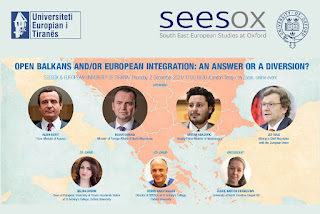On 2 December 2021 SEESOX in cooperation with The European University of Tirana hosted an online panel discussion on the European and regional state of play of the Western Balkan countries entitled: “Open Balkans and/or European integration: An answer or a diversion?” Speakers included Albin Kurti, Prime Minister of Kosovo, Dritan Abazovic, Deputy Prime Minister of Montenegro, Zef Mazi, Albania’s Chief Negotiator to EU, and with Jessie Barton Hronesova, University of North Carolina-Chapel Hill, as a discussant. Othon Anastasakis, Director of SEESOX and Belina Budini, Dean of Faculty of Humanities, Education and Liberal Arts at European University of Tirana, co-chaired the event.
In his introduction Othon Anastasakis pointed out that the Open Balkans Initiative, like many other initiatives in the past, is based on ambitious principles of open borders, labor mobility and integrated regional market. But as many things in the region, it has also generated criticism and the mere fact that some countries are in and some countries not, is a testimony of the ambivalence of the project; some see it as an asset, while others as a liability and in competition with the European integration process.
Belina Budini, in her introduction of the topic pointed out that the Open Balkan Initiative, aiming at the creation of an open regional market, and signed by Albania, North Macedonia and Serbia, unavoidably raises the issue of compatibility with the European integration of the Western Balkan countries and their accession to the EU. Even though the project is represented as a call for action in response to the delay in obtaining EU membership, it has also attracted criticism on the grounds that it makes the region more vulnerable.


















